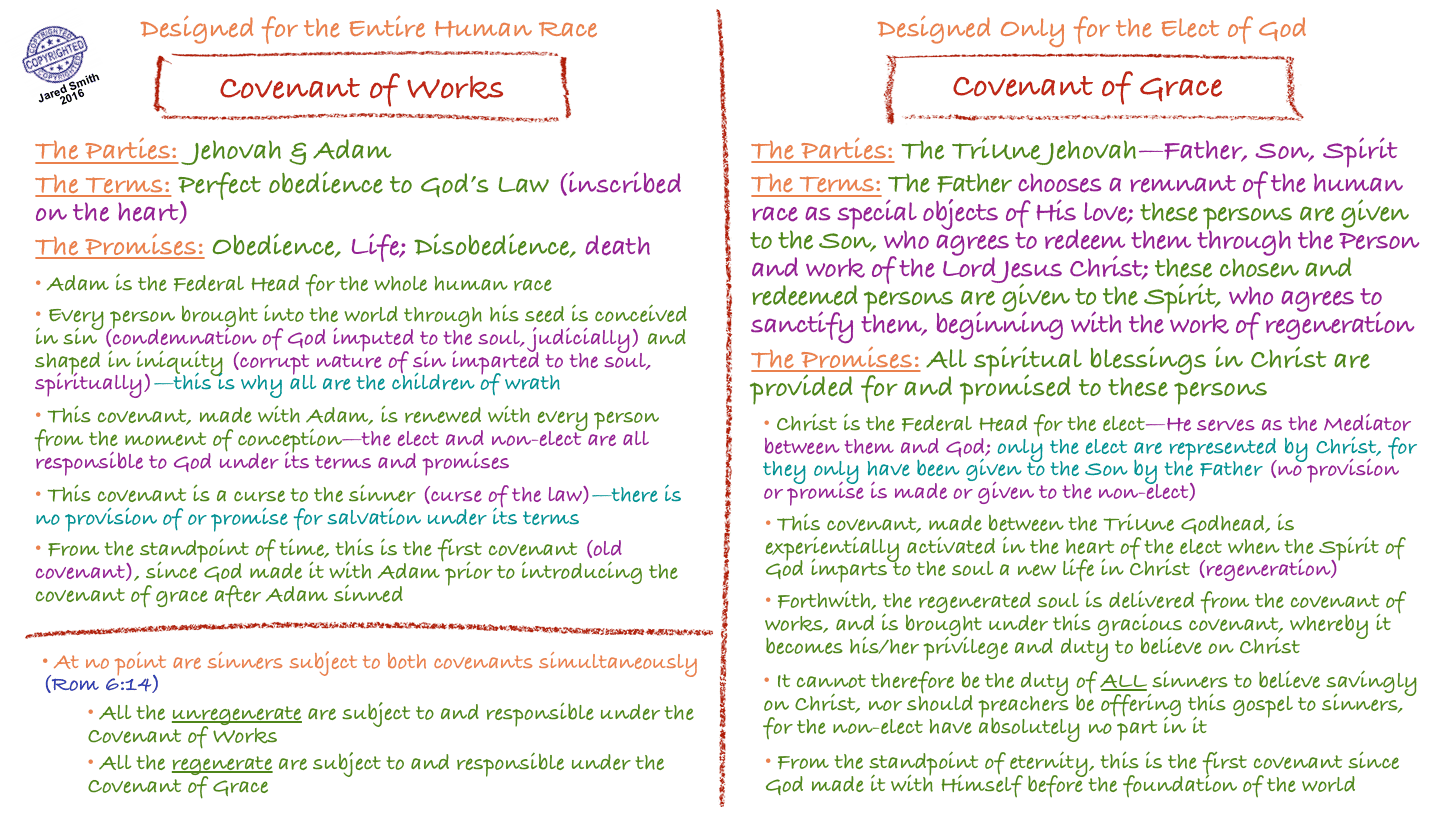
High-Calvinism: Fleshing It Out
First, at no time is a sinner duty-bound under both covenants simultaneously.
Second, so long as the sinner remains unregenerate, he/she is held accountable under the terms and promises of the Covenant of Works (not the Covenant of Grace).
Third, once the sinner has been born again, he/she is delivered/released from the Covenant of Works, being brought experientially under the terms and promises of the Covenant of Grace.
Fourth, the non-elect have absolutely no part in the Covenant of Grace—it is not their duty to believe savingly on Christ, nor is it the duty of the preacher to offer Christ to them. Christ does not represent them, neither has He made provision for them through His Mediatorial work.
Fifth, the regenerated sinner has absolutely no more part in the Covenant of Works—he/she is no longer under the law (Covenant of Works), but under grace (Covenant of Grace).
It is often assumed regeneration restores the soul to its original creation as that given to Adam, and therefore the sinner is forthwith enabled to keep the law God has inscribed upon the heart as required under the Covenant of Works. However, no sinner is able to stand before God as did Adam, for Adam’s relation to God was without that saving union to Christ required by the sinner. Indeed, it is that saving union to Christ, by the personal indwelling of the Holy Spirit, that places the sinner in a completely new standing with God. Henceforth, it is in this capacity the regenerated sinner is released from the Covenant of Works, having become God’s “workmanship, created in Christ Jesus unto good works, which [He] hath before ordained that [he/she] should walk in them.” (Eph 2:10). The Covenant of Grace, with all spiritual blessings in Christ, is the new set of terms and promises with which the regenerated sinner is made a partaker and held accountable. Those that hold this view are often labeled Antinomians (anti – ‘against’ + nomos – ‘law’ = ‘against law’). It is argued since the High-Calvinist believes the regenerate sinner is released from the Covenant of Works (perfect obedience to the law inscribed upon the heart), that he/she lives without any law. But this is not true. The Covenant of Grace is the law of Christ, and it is under this new law the regenerate sinner is responsible.
Sixth, the foregoing distinctions between the two covenants is what ultimately separates the High-Calvinist from the Moderate-Calvinists (Fullerites) and the Arminians.
They believe the issue revolves around the question as to whether the sinner has the ability to believe on Christ. The Arminians say ‘yes’, and therefore insist all sinners are duty-bound to believe on Christ to the saving of the soul. The Moderate-Calvinists say ‘no’, but will argue a sinner’s inability doesn’t diminish his/her responsibility/accountability—henceforth, they also insist all sinners (elect/non-elect) are under a moral obligation to believe on Christ to the saving of the soul. However, this is not the central issue that leads the High-Calvinist to reject the pernicious doctrines of duty-faith and the free-offer. Rather, the issue revolves around the terms and promises of two very different covenants. Whereas the High-Calvinist rightly recognizes the unregenerate and the regenerate can only be under the terms and promises of one or the other covenant at any given time, yet the other groups assume all sinners are duty-bound to both covenants simultaneously. Subsequently, they demand duties of the unregenerate that only belong to the regenerate (such as believing on Christ), and then they demand duties of the regenerate that only belong to the unregenerate (such as perfectly obeying God’s law inscribed upon the heart). Forthwith, Moderate-Calvinists (Fullerites) and Arminians preach a confused gospel mingled with works and grace. This perverted gospel not only facilitates in the mass production of false converts, but it also serves to bring the children of God back under the bondage of the law (Covenant of Works). Now, these are not new problems confronting the church in a modern age, but very old issues indeed—Paul dealt with all of them at length in his epistles, especially that of Romans and Galatians.
Seventh, the Covenant of Works is not one and the same with the Mosaic Covenant.
Many people assume, that because both covenants share similar terms (obedience to God’s law), that the sinner is therefore duty-bound to the Mosaic Covenant, and it is the ten commandments with which God holds the individual accountable. However, I would ask the reader to consider the difference between these covenants: (1) The Covenant of Works (CW) is designed for the whole human race; the Mosaic Covenant (MC) was designed for Israel as a nation; (2) The CW was made between Jehovah and Adam; the MC was made between Jehovah and Moses; (3) The terms of the CW is perfect obedience to God’s Law (inscribed upon the heart); the terms of the MC was obedience to God’s law which incorporated a three-fold mix of moral, judicial and ceremonial commandments; (4) The promises of the CW was eternal life upon obedience, or eternal death upon disobedience (spiritual and eternal in nature); the promises of the MC was the inheritance of the promised land (Canaan) upon obedience, or expulsion from that land upon disobedience (material and temporal in nature). Now, aside from these differences, consider more closely the moral law. The moral law, under the Mosaic Covenant, was one of three sections of the law that God instituted for Israel as a nation—no other nation was required to keep this law, and indeed, most of the Gentile world was never made privy to it. The only law that has been perpetually binding upon the human race is that which is inscribed upon the heart, and summarized by Christ in Mark 12:29-31: “The first of all the commandments is, Hear, O Israel; The Lord our God is one Lord: and thou shalt love the Lord thy God with all thy heart, and with all thy soul, and with all thy mind, and with all thy strength: this is the first commandment. And the second is like, namely this, Thou shalt love thy neighbour as thyself. There is none other commandment greater than these.” As Adam was appointed the Federal Head of the human race (not Moses), it is that covenant Jehovah made with him that is binding upon all his posterity. Henceforth, it is important to distinguish between these covenants when reading the New Testament—sometimes reference is made to the Covenant of Works, and other times it is in connection with the Mosaic Covenant. But at no time should these covenants be mingled together—to do so has been the cause of much confusion concerning the teachings of scripture and its application to one’s life.
Jared Smith served twenty years as pastor of a Strict and Particular Baptist church in Kensington (London, England). He now serves as an Evangelist in the Philippines, preaching the gospel, organizing churches and training gospel preachers.
Jared Smith's Online Worship Services
Jared Smith's Sermons
Jared Smith on the Gospel Message
Jared Smith on the Biblical Covenants
Jared Smith on 18th Century Covenant Theology (Hyper-Calvinism)
Jared Smith on the Gospel Law
Jared Smith on Bible Doctrine
Jared Smith on Bible Reading
Jared Smith's Hymn Studies
Jared Smith on Eldership
Jared Smith's Studies In Genesis
Jared Smith's Studies in Romans
Jared Smith on Various Issues
Jared Smith, Covenant Baptist Church, Philippines
Jared Smith's Maternal Ancestry (Complete)







